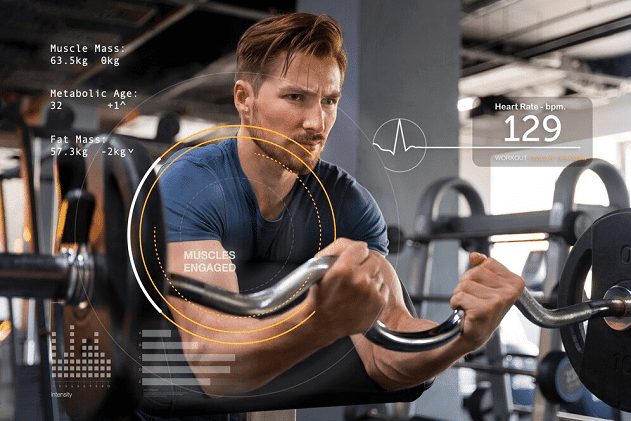AI in Sports Psychology: Helping Athletes Build Mental Resilience

People often concentrate on the physical aspects of sports, like sprinting, stamina, and powerful movements. But what truly sets champions apart is concealed: mental strength. Being able to control emotions, confidence, and focus helps an athlete recover from missing a goal, endure stress, and remain centered when required.
The psychology of sports has always helped train athletes to control their minds. Still, now AI is providing a new dimension—innovative tools and insights to build mental resilience in athletes, and offer customized support like never before.
The Brain Game: Where AI Steps In
Classic methods of sports psychology heavily depend on human observation, individual sessions with athletes, and feedback from the athlete. While these methods accomplish their purpose, they have many limitations in their application and frequency. AI meets those limitations by providing 24/7 monitoring, data-based evaluation, and immediate response systems.
This shift has implications beyond the field, too. Whether you’re tracking how athletes perform under pressure or reviewing pre-match trends, online betting platforms increasingly reflect insights that include not just form but mindset indicators as well. Currently, AI technologies can analyze voice patterns, eye movements, heart rate variability, and even facial features to determine if there is stress, anxiety, or emotional exhaustion. These tools do not substitute licensed psychologists, but serve as aides in providing real-time information to assist athletes and coaches in comprehending internal situations.
AI helps mental training by supplying personalized meditation, visualizations, and cognitive behavioral intervention exercises through applications and wearable devices. During training sessions, athletes can be provided with nudges, prompts to refocus during breaks, or even alerts when signs of psychological strain are detected—all tailored to the individual.
Mental Fitness Becomes a Daily Routine
A considerable improvement, powered by AI, is consistency. Mental toughness training is no longer reserved for crises. AI tools enable athletes to include mental training in their everyday exercises, just like they do with stretching or eating.
Mindset workouts have also been tailored into short attention training, focus game drills, and check-in mood tracking exercises that many teams practice routinely. The AI observes results longitudinally, understanding when an athlete is most focused or struggling and how different stressors impact their performance.
This establishes an ongoing feedback system that keeps athletes proactive and mentally agile, instead of merely responsive to problems. Teams and brands now use platforms like MelBet to highlight athlete routines, mindset shifts, and the role of mental training in the new performance culture.
Benefits That Go Beyond the Game
Mental resilience not only allows for peak performance on the day of the event but also allows for well-being in general. Elite-level athletes are constantly under a lot of pressure. On top of the high expectations, there is also social media and media attention, which adds a mental burden that can be very hard to deal with.
Athletes can check in with a chatbot, fill out digital reflection exercises, or get stress relief advice without attending an entire therapy session. These AI approaches to mental wellness are more private and easier to obtain. Younger players starting their journeys with a competitive league can also benefit. AI-based feedback can help shift their mentality and make mental fitness the norm right from the start, making it a fundamental part of training rather than a topic deemed uncomfortable.

The Power of Data: Tracking the Invisible
With AI, sports psychology has something it has never had before: precise data. Everything from emotions to focus and stress can now be quantified accordingly. Coaches can witness how mental exhaustion aligns with drops in physical performance. Athletes can measure their progress in mental conditioning over time.
With this information, actions can be done more efficiently. If players’ focus wanes before matches, they can be instructed on pregame routines. If stress increases during interviews or travel days, plans can be made to accommodate the player.
Here’s what AI-powered mental resilience tools typically track:
- Focus consistency: How long an athlete stays locked in
- Recovery patterns: How quickly they bounce back after errors
- Stress indicators: Heart rate, facial tension, or language use
- Mood trends: Based on daily inputs and behavioral signals
- Response to pressure: Performance under high-stakes moments
Still Human at the Core
We should bear in mind that AI will never replace human connection. Mental fortitude cannot be achieved through information alone; there is also trust, emotions, and situational relevance. Psychologists specializing in sports still offer unique assistance. However, with AI available, their work is better informed, more precise, and tailored to individual needs.
Both, in collaboration, form a multi-layered system that aims to anticipate issues rather than only respond to them. This equips the athlete to handle stress not just when it arises but enables them to become increasingly mentally resilient over time.
Final Thoughts
Mental fortitude is essential for achieving remarkable feats in athletics. However, it has traditionally combined difficulty building, measuring, and tracking. AI technology is already making vast improvements in areas like breath-by-breath stress tracking and daily mental techniques.
With the availability of these tools, the new generation is bound to prove to be superior athletes, but even more astonishing will be their profoundly intricate balance of mental and physical strength.




